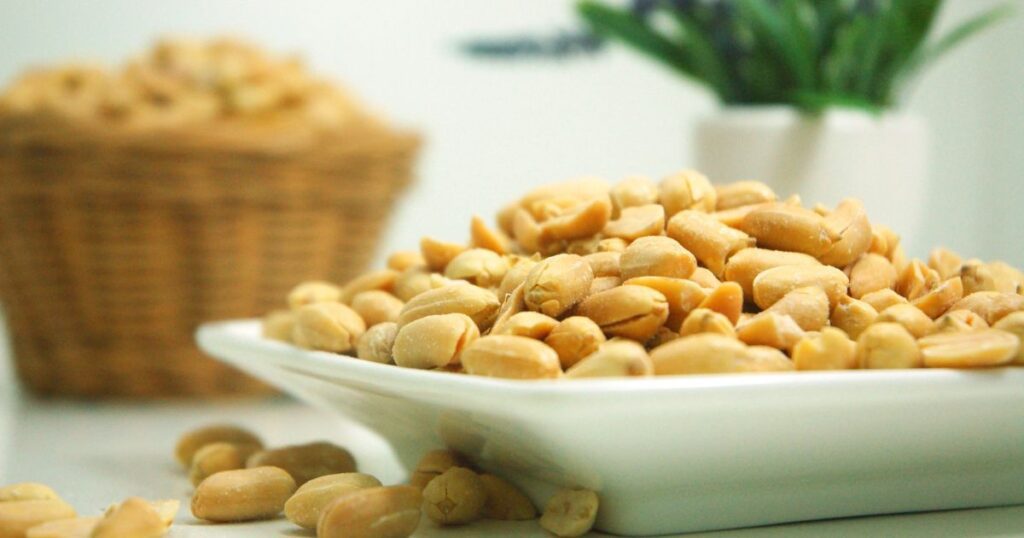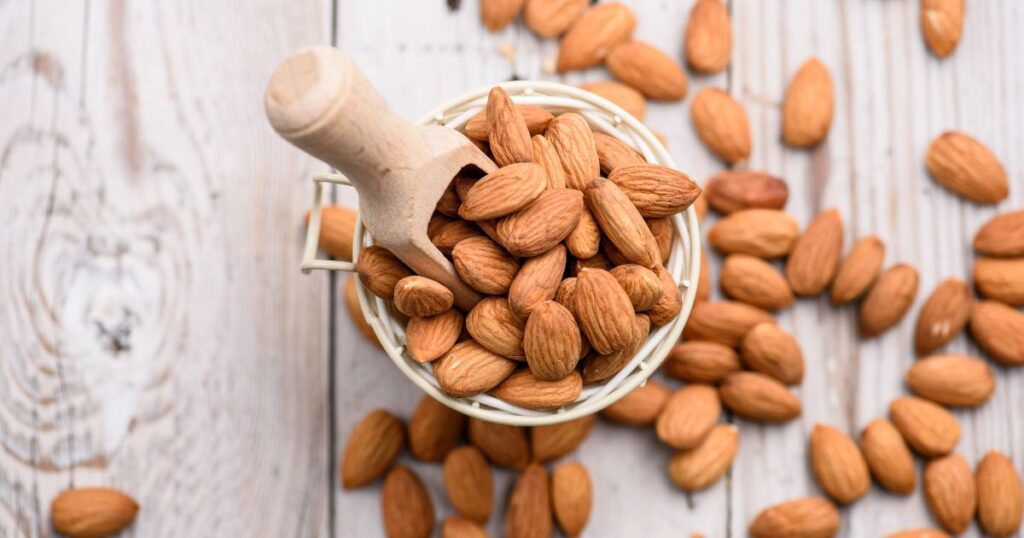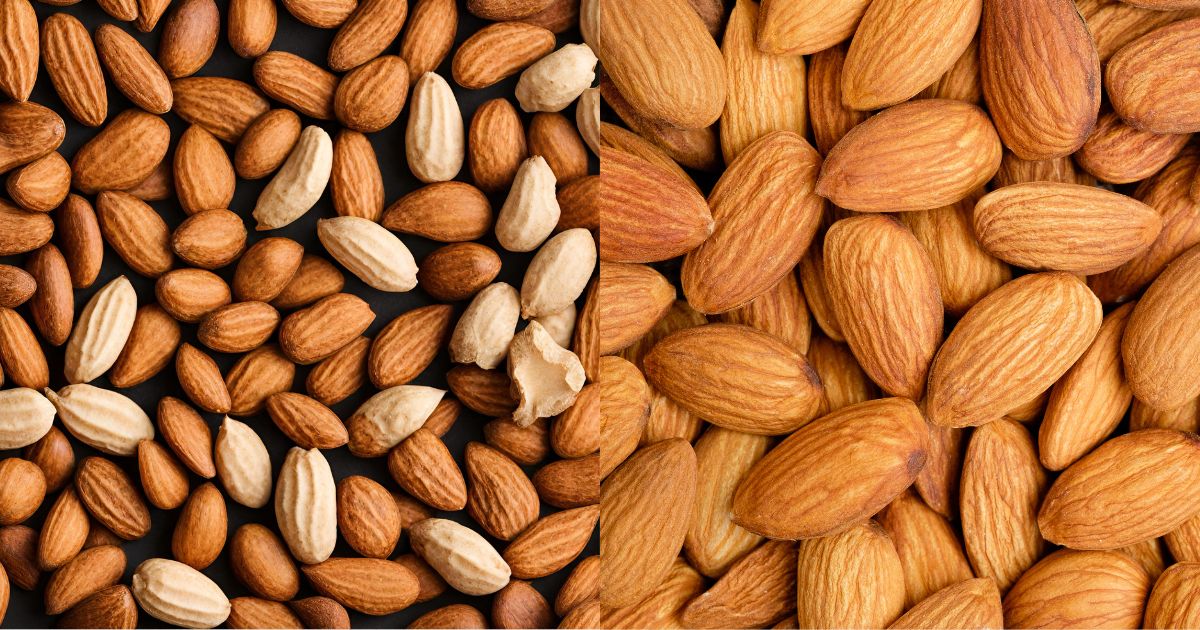In the nutritional arena, the clash between peanuts vs. almonds unfolds with each nut showcasing its unique advantages, creating a flavorful tapestry of health benefits. The world of nuts is vast, but two contenders often steal the spotlight – peanuts and almonds. As you reach for that handful of crunchy goodness, have you ever wondered about the benefits each nut brings to the table? Let’s dive into the nutritional arena and explore the unique advantages of peanuts and almonds.
Table of Contents
ToggleNutritional Comparison
Peanuts

Let’s unravel the nutritional marvel that is the peanut. These little wonders, technically classified as legumes, pack a powerful punch when it comes to nutrition.
Protein-Packed Goodness
One of the standout features of peanuts is their impressive protein content. Proteins are the building blocks of life, essential for the growth, repair, and maintenance of body tissues. Peanuts provide a reliable source of plant-based protein, making them an excellent choice for vegetarians and vegans.
Healthy Fats for Heart Health
Contrary to the myth that all fats are unhealthy, peanuts contain heart-healthy fats. The monounsaturated and polyunsaturated fats found in peanuts contribute to lower bad cholesterol levels, reducing the risk of cardiovascular diseases. These healthy fats also support the absorption of fat-soluble vitamins, enhancing overall nutritional intake.
Essential Nutrients for Well-being
Peanuts are a nutrient-dense snack, offering a rich supply of essential vitamins and minerals. Biotin, niacin, and folate are particularly abundant, playing crucial roles in maintaining skin health, supporting the nervous system, and promoting cell division. Including peanuts in your diet can contribute to overall well-being.
Almonds: Heart’s Best Friend

Shifting our focus to almonds, these tree nuts have rightfully earned a reputation as the heart’s best friend. Let’s delve into the nutritional treasure trove that almonds offer.
Vitamin E for Skin and Immunity
Almonds are a powerhouse of vitamin E, a potent antioxidant renowned for its skin-loving properties. Antioxidants play a crucial role in neutralizing free radicals, protecting the body from oxidative stress, and supporting a robust immune system. Including almonds in your diet can contribute to radiant skin and overall health.
Magnesium for Nerve and Muscle Function
Magnesium, another star player in almonds, is essential for nerve and muscle function. Adequate magnesium levels contribute to optimal nerve signaling and muscle contraction, promoting overall physical well-being. Almonds provide a tasty and nutritious way to meet your magnesium needs.
Monounsaturated Fats for Cardiovascular Health
Almonds are rich in monounsaturated fats, which have been associated with heart health. Regular consumption of almonds has been linked to lower levels of bad cholesterol, reducing the risk of heart disease. The inclusion of these heart-friendly fats in your diet can be a tasty and beneficial choice.
Versatility in Health Benefits
Both peanuts and almonds bring their unique set of health benefits to the table. Peanuts excel in providing plant-based protein and essential nutrients, making them a nutritional powerhouse. Almonds, on the other hand, stand out for their heart-protective qualities, skin-loving vitamin E, and muscle-supporting magnesium.
Health Benefits of Peanuts
Cardiovascular Benefits: Nourishing the Heart
Dive into the world of cardiovascular well-being, and you’ll find that peanuts have earned a spot as a heart-healthy snack. A substantial body of research suggests that incorporating peanuts into your diet can contribute to maintaining a healthy heart.
Cholesterol Ally
One of the notable contributions peanuts make to heart health is their ability to lower bad cholesterol levels. Bad cholesterol, or low-density lipoprotein (LDL), can accumulate in the arteries, leading to atherosclerosis and increasing the risk of heart disease. Peanuts act as allies in reducing these harmful cholesterol levels, promoting cardiovascular health.
Flexibility for Better Circulation
The flexibility of blood vessels is a critical aspect of heart health. Research indicates that peanuts may play a role in enhancing blood vessel flexibility. Flexible blood vessels allow for smoother blood flow, reducing the strain on the heart and decreasing the likelihood of hypertension and related cardiovascular issues.
Weight Management Properties: Nurturing a Balanced Physique
Surprisingly, despite being calorie-dense, peanuts can be a valuable asset in weight management endeavors. The key lies in the dynamic duo of fiber and protein that peanuts bring to the table.
Satiety and Appetite Control
The combination of fiber and protein in peanuts provides a sense of satiety, helping to control appetite and curb excessive calorie consumption. Feeling full for longer periods can be a game-changer for those aiming to manage their weight. Including peanuts as part of a balanced diet may contribute to achieving and maintaining a healthy weight.
Metabolism Boost
Beyond just satiety, the protein in peanuts plays a role in boosting metabolism. A higher metabolism can aid in burning calories more efficiently, supporting weight loss or weight maintenance goals. The nutrient synergy within peanuts makes them a tasty and effective addition to a weight-conscious diet.
Antioxidant Content and Immune Support: Fortifying the Body
Peanuts are not just about the heart; they’re also champions in fortifying the immune system, thanks to their robust antioxidant content.
Antioxidants: Shielding Against Oxidative Stress
Oxidative stress, caused by free radicals in the body, can lead to various health issues, including immune system compromise. Peanuts, with their arsenal of antioxidants, act as a shield against oxidative stress. Antioxidants neutralize free radicals, reducing the risk of cellular damage and supporting overall immune function.
Immune System Support
The immune system is our body’s defense against infections and illnesses. Peanuts, with their immune-boosting antioxidants, contribute to the overall resilience of the immune system. Including peanuts in your diet can be a tasty strategy to fortify your body’s natural defenses.
Health Benefits of Almonds
Heart Health Advantages: Almonds Taking the Lead
In the ongoing debate of peanuts vs almonds, almonds take the spotlight with their impressive contributions to heart health. Numerous studies have hailed almonds as heart-friendly nuts, linking their consumption to a range of cardiovascular benefits.
Lower Cholesterol Levels
One of the standout advantages of almonds is their potential to lower cholesterol levels. High levels of low-density lipoprotein (LDL) cholesterol can increase the risk of heart disease. Studies suggest that including almonds in your diet may contribute to reducing LDL cholesterol, offering a protective shield for your heart.
Reduced Risk of Heart Disease
Beyond just lowering cholesterol, almonds have been associated with a reduced risk of heart disease. The unique combination of monounsaturated fats, polyunsaturated fats, and other heart-healthy nutrients in almonds makes them a potent ally in maintaining cardiovascular well-being.
Peanuts vs Almonds: A Heart-Centric Battle
Comparing peanuts vs almonds in the context of heart health reveals interesting nuances. While both nuts have heart-friendly attributes, almonds seem to have a slight edge in studies, specifically highlighting their impact on cholesterol levels and heart disease risk reduction.
Weight Control Benefits: Almonds for Satiety
In the arena of weight control, almonds showcase their prowess, creating a compelling argument in the ongoing peanuts vs almonds debate.
Fiber and Protein Combo
Almonds stand out for their rich fiber and protein content, a combination that works synergistically to induce a feeling of fullness. This satiating effect can be instrumental in controlling appetite, making almonds an excellent choice for those aiming to manage their weight.
Nutrient-Rich Snacking
Choosing almonds as a snack not only satisfies hunger but also provides essential nutrients. Unlike empty-calorie snacks, almonds offer a nutrient-dense option that supports overall health while aiding in weight control.
Almonds as a Source of Antioxidants and Vitamins: Nourishing Skin and Fighting Oxidative Stress
Beyond the cardiovascular arena, almonds reveal another dimension of their health benefits through their rich vitamin E and antioxidant content.
Vitamin E for Radiant Skin
Almonds are a natural source of vitamin E, a potent antioxidant known for its benefits to skin health. Regular consumption of almonds can contribute to a radiant complexion and combat signs of aging, making them a delightful addition to your beauty routine.
Antioxidant Defense Against Oxidative Damage
The antioxidants in almonds play a crucial role in defending the body against oxidative damage. Oxidative stress, caused by free radicals, can contribute to various health issues. Including almonds in your diet provides a powerful defense mechanism, safeguarding your cells from potential harm.
Allergies and Considerations
When it comes to the peanuts vs almonds dilemma, one critical aspect that demands attention is allergies. While both nuts offer an array of health benefits, it’s essential to be aware of potential allergic reactions that can vary between peanuts and almonds.
Peanut Allergies: A Cautionary Tale
Peanuts, despite their nutritional richness, can be a source of concern for those susceptible to allergies. For individuals with peanut allergies, exposure to even the smallest amounts can trigger severe allergic reactions. These reactions may range from mild symptoms such as hives and itching to more severe manifestations like difficulty breathing and anaphylaxis.
In the peanuts vs almonds debate, it’s paramount to recognize that peanut allergies are relatively common and can be life-threatening. As such, individuals with peanut allergies should exercise utmost caution when considering peanuts in their diet. It’s not merely a matter of taste preference but a vital aspect of ensuring personal safety.
Almond-Related Considerations: A Lesser-Known Allergen
On the almond side of the peanuts vs almonds spectrum, allergies are generally less common. Almonds belong to the tree nut family, and while tree nut allergies exist, they are less prevalent than peanut allergies. However, it’s crucial to note that individuals with tree nut allergies should still exercise caution when dealing with almonds.
Cross-reactivity between different tree nuts can occur, meaning that someone allergic to one type of tree nut may also react to another. In the peanuts vs almonds context, those with tree nut allergies should consult with allergists to determine whether almonds pose a risk for them. Vigilance is key, as allergic reactions can vary in severity and may include symptoms such as swelling, digestive issues, and respiratory distress.
Alternatives for Those with Allergies: A Nutritious Path Forward
For individuals navigating the challenges of allergies in the peanuts vs almonds debate, some alternatives offer a safe and nutritious path forward. Sunflower seeds and pumpkin seeds stand out as excellent alternatives, providing a rich source of nutrients without the allergen concerns associated with peanuts and almonds.
Sunflower seeds, packed with vitamin E, magnesium, and healthy fats, can be a versatile addition to various dishes. Pumpkin seeds, also known as pepitas, offer a nutritional powerhouse with zinc, iron, and fiber. Incorporating these alternatives into your diet ensures that individuals with allergies can still enjoy the benefits of nutrient-dense seeds without compromising their health.
In the peanuts vs almonds conundrum, navigating allergies requires a personalized approach. It’s not just about the nutritional content but understanding individual sensitivities and making informed choices that prioritize health and safety. Whether opting for peanuts, almonds, or allergy-friendly alternatives, a mindful approach ensures that everyone can partake in the delicious world of nuts without worry.
Cost Comparison
Crunching the Numbers: Peanut vs. Almond – A Cost Comparison
In the ongoing debate of peanut vs. almond, one significant factor often influences the choice made by consumers—the cost. As we explore the economic landscape of these two nutty contenders, it becomes evident that both peanuts and almonds bring unique offerings to the table, not only in terms of nutrition but also in affordability.
The Almond’s Premium Price Tag
Almonds, often celebrated as a nutritional powerhouse, come with a reputation that extends beyond health benefits—a relatively higher price tag. The production and cultivation of almonds, particularly in regions with specific climate requirements, contribute to their elevated cost. This premium pricing can sometimes act as a deterrent for budget-conscious consumers.
However, it’s essential to recognize that the extra dollars spent on almonds may translate into a plethora of health advantages. The nutrient-rich profile of almonds, packed with heart-healthy monounsaturated fats, vitamin E, and essential minerals, justifies their higher cost for those prioritizing nutritional density.
Peanuts: The Budget-Friendly Nut
On the other side of the peanut vs. almond cost spectrum, we find peanuts—often lauded as the more budget-friendly option. Peanuts, belonging to the legume family, are cultivated in diverse climates and boast a more straightforward cultivation process. This simplicity in production contributes to their affordability, making peanuts accessible to a broader demographic.
While peanuts may come at a lower price point, they don’t compromise on nutritional value. Peanuts are rich in protein, healthy fats, and an array of essential nutrients, offering a cost-effective solution for those looking to enhance their diet without breaking the bank.
Peanuts vs Almonds: Balancing the Budget and Nutrition
The peanuts vs almonds debate becomes a delicate dance between budget considerations and nutritional aspirations. For those aiming to strike a balance between a healthy diet and financial constraints, peanuts emerge as a practical choice. They provide a wallet-friendly alternative without sacrificing the nutritional benefits associated with nut consumption.
Consumers with a more flexible budget or those placing a premium on specific health attributes may lean towards almonds, appreciating the added nutritional value they bring to the table. The key lies in aligning dietary choices with individual priorities and financial goals.
Cost-Effective Nutrition: Peanuts Leading the Charge
In the grand scheme of dietary decisions, the peanuts vs almonds cost comparison underscores an essential principle—nutrient-dense choices need not always come with a hefty price tag. Peanuts shine as a testament to the idea that quality nutrition can be both accessible and affordable.
Myth Busting
In the vast world of nutrition, myths often cloud the perception of various food choices, and the debate of peanuts vs almonds is no exception. Let’s embark on a myth-busting journey to unravel common misconceptions surrounding these two nutty contenders and gain clarity on their true nutritional impact.
Myth: Peanuts Are Unhealthy
The first myth that needs debunking is the notion that peanuts are unhealthy. Some misconceptions associate peanuts with being high in unhealthy fats and detrimental to overall health. However, the truth is quite the opposite.
Peanuts, technically legumes, are a nutrient-dense powerhouse. Packed with protein, healthy fats, and essential nutrients like biotin, niacin, and folate, peanuts contribute positively to cardiovascular health, weight management, and immune support. The key lies in moderation and incorporating them into a balanced diet.
Myth: Almonds Are Only for the Health-Conscious
Contrary to the myth that almonds are exclusively for the health-conscious, these nuts offer a delightful blend of both health benefits and culinary versatility. While it’s true that almonds are celebrated for their heart-healthy monounsaturated fats, vitamin E, and antioxidant content, it doesn’t mean they are reserved only for those focused on health.
Almonds are a delightful addition to various dishes, both sweet and savory, adding flavor, texture, and a nutritional boost. Whether it’s almond-crusted chicken or a simple almond snack, these nuts cater to diverse taste preferences and culinary adventures.
Navigating Peanuts vs Almonds: Busting the Dichotomy Myth
Another prevalent myth is the creation of a binary choice between peanuts and almonds, framing them as mutually exclusive options. This oversimplified narrative misses the nuanced reality that both peanuts and almonds offer unique nutritional benefits.
In the peanuts vs almonds debate, it’s not about declaring one superior to the other. Instead, it’s about understanding the distinct nutrients each brings to the table and making choices based on individual health goals, taste preferences, and dietary requirements.
The All-or-Nothing Myth: Busting Extremes in Nut Consumption
Some myths propagate the idea that nuts should be either completely avoided or consumed in excessive quantities. The truth lies in moderation. Both peanuts and almonds, when enjoyed in appropriate portions, contribute positively to overall health.
Including nuts as part of a balanced diet provides an array of nutrients and flavors, and there’s no need to fear them or indulge excessively. Moderation is the key to unlocking the nutritional benefits without falling victim to unfounded extremes.
Don’t Miss: Are Black Raisins Good For You?
Conclusion
In the complex landscape of peanuts vs almonds, the conclusion is not about declaring a winner but celebrating the diversity each nut brings to the table. Both peanuts and almonds offer distinct textures, flavors, and nutritional profiles, allowing you to tailor your choices to your taste preferences and health objectives.
Whether you savor the creamy goodness of peanuts or delight in the satisfying crunch of almonds, it’s essential to recognize that both nuts contribute positively to your well-being. From cardiovascular benefits and weight management properties to antioxidant-rich offerings, each nut brings a unique set of health advantages.
As you navigate the world of nut choices, let personal taste and nutritional goals guide your decisions. The peanuts vs almonds debate is not about choosing sides; it’s about embracing the richness and versatility each nut provides. So, go ahead, enjoy the nutty goodness, and relish the fact that you have a diverse array of options to elevate both your palate and your health.
FAQs
- Are peanuts and almonds suitable for a weight-loss diet?
- Both peanuts and almonds can be part of a weight-loss diet when consumed in moderation due to their satiating properties.
- Can people with nut allergies consume peanut butter?
- Individuals with peanut allergies should avoid peanut butter. Almond butter can be a safe alternative for those without tree nut allergies.
- What is the environmental impact of almond production?
- Almond production is associated with a higher environmental impact compared to peanuts. Consider this when making sustainable choices.
- Do roasted peanuts and almonds lose their nutritional value?
- Roasting can alter the nutrient composition, but the impact is minimal. Enjoying them in moderation maintains their nutritional benefits.
- How can I incorporate peanuts and almonds into a vegan diet?
- Peanuts and almonds are excellent sources of plant-based protein. Use them in salads, stir-fries, or enjoy nut butter on whole-grain toast.
In the ever-expanding world of nuts, the choice between peanuts and almonds ultimately boils down to personal preference and dietary goals. Embrace the nutty goodness, knowing that each bite contributes to your overall well-being.
